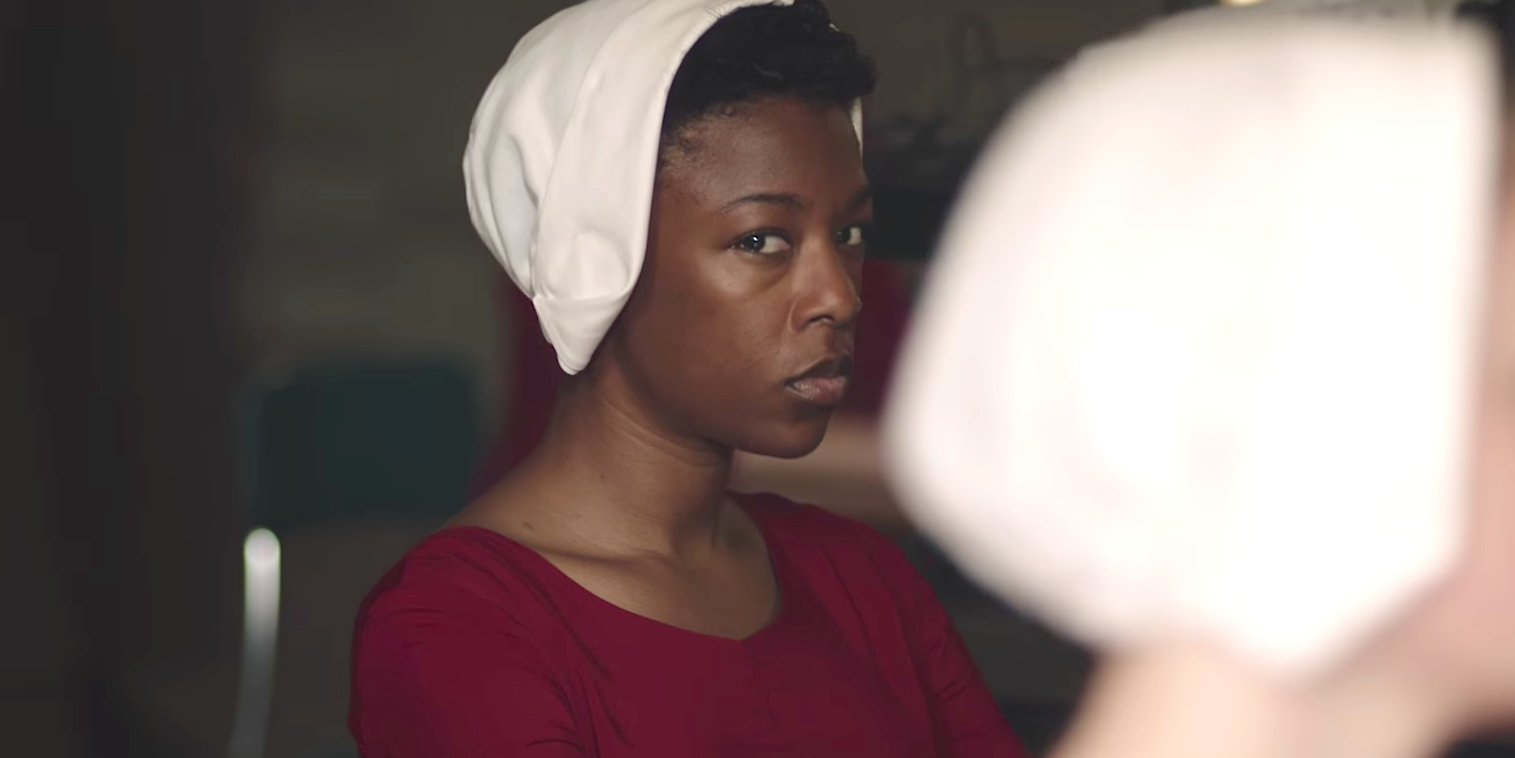The Handmaid's Tale: Further Thoughts
As promised, the second half of my thoughts on Hulu's adaptation of The Handmaid's Tale - namely, the differences from the novel and how I felt about them. This will have major spoilers for the series, so if you haven't watched yet, you might want to bookmark this and come back later.
Ofglen's Backstory
In the novel, Ofglen, Offred's shopping partner and fellow Handmaid, is largely a mystery. Her primary function is to tell Offred that there's more to what's going on in Gilead than it seems, and that a resistance, and possible hope, exists. She's a symbol that there's both more to fear and more to possibly live for - and that's really all we know about her. When the Eyes come for her at the end of the novel, she kills herself rather than be captured and tortured for information. The adaptation, on the other hand, gives her a wife and child before Gilead, a reason for having been taken as a Handmaid.
Overall, this is a great choice for the series - it gives emotion and depth to a character who would otherwise be a mere plot device, and helps the viewers understand that the main goal for Gilead is breeding. Fertile women get more chances than infertile ones - when this Ofglen is captured by the Eyes, it's not for being a member of the resistance, but for an affair with a Martha. The Martha is simply hung for the infraction, while Ofglen is allowed to live - after being mutilated to remove her "unnatural" urges. As a potential breeder, she's simply worth more.
On the other hand, I was disappointed in how giving Ofglen more depth ended up robbing her of most of her heroic moments. Rather than sacrifice herself for her ideals, she's mutilated and sent back to the baby-mines. When she does finally go out in a blaze of glory, there's a sense that it's because she's given up on herself, rather than to protect the underground network they've created. During the Patricicution scene, in the novel, it's Ofglen who delivers the killing blow, to put a fellow rebel out of his misery. In the adaptation, she watches, horrified, as Offred does the deed, for a very different motivation. At times, it feels like the really compelling parts of Ofglen's personality in the book have been shifted over to Offred for the series. Ultimately, more characterization is good, but it seems like the writers could have found a way to give her a bit of both.

Moira
I have similar feelings about how Moira is portrayed. In the novel, she's a badass who attempts escape multiple times, risking life and limb in order to live by her principles. The fact that she doesn't get to do that, but instead becomes resigned to a life of prostitution at Jezebel's, is one of the most heartbreaking scenes in the book. If "don't let the bastards grind you down" is Offred's mantra, her magic words to get her through her days with some semblance of sanity, then Moira is the talisman that goes with them, the words made flesh. When she gives up, it is a blow to Offred's personal faith.
The adaptation has some of these elements, but from the outset, Moira is far more timid. She is given only one escape attempt from the Red Center - the first is now made by Offred. Her second, successful attempt, made alone in the book, is aided by Offred. Even prior to that, her message to Offred seems far more about keeping their heads down and surviving than fighting the power; it is Offred who seems more openly defiant.
Again, there's some sense to these choices - if, as the show runners seem to, you want Offred to be more than just a woman recounting the plain facts of what happened to her - if you want her to be a hero, a symbol of resistance. That's fine, but the underlying message of the novel, to me, wasn't just about the dangers of being a woman in a man's world - it was about the dangers of complacency, in believing that everything will work out for the best, because nothing bad has ever happened to you, and it was about how when the bad times come, sometimes the best victory you can hope for is to just keep on living. However that message means you need to have a character, like novel-Offred, who's more passive than active, and that's not what we expect from our television.
What's up with Mexico? By episode five, the adaptation takes a few major swerves from the novel by revealing Luke's status, and by introducing a global perspective in the form of a trade delegation from Mexico. The novel's scope is small and personal, truly Offred's tale. The series has grander ambitions, and while they're still well done, it's hard for me not to feel a little cynical about them, that the primary imperative is to get more seasons of the show approved. While a great way to do that is to explore the reactions of the rest of the world to Gilead, it could have been done outside of the context of Offred's story. There's a whole world to play in - why not tell this one story and then create new characters and explore their perspectives?
This Is Not My Beautiful House One final minor point, since folks have asked: yes, it is jarring to watch a dystopian near future set in the place where you live, and it is more jarring that what you're watching on the screen is so clearly filmed somewhere else. I was struck by how quickly I recognized Harvard Square when reading the book, even before it was named, and what we see is most definitely not Harvard Square.
Are you watching? Have you read the book? What do you think? Will you tune in for season 2?
